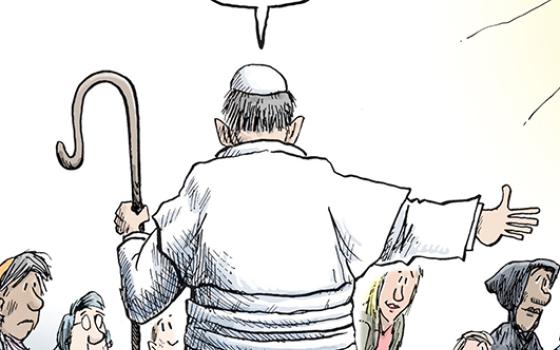
When he’s not serving as chaplain to a monastery of contemplative nuns in the heart of Hollywood, Dominican Fr. Dominic DeLay is making films. His latest, “Inside Darkness,” is a 35-minute political suspense thriller that has its origins in the last presidential election when he said he was left with the question of how good and smart people could think so differently from himself about politics. Available on DVD at www.insidedarkness.com, the film, starting Oct. 13, will be released in free seven-minute “webisodes” with the last installment the day before the election Nov. 4.
Fr. DeLay, 46, earned a MFA in film in 2003 and as an undergraduate attended Occidental College at the same time that Barack Obama was there as a student. “I may have been at his first political speech,” he mused.
What is your movie about?
“Inside Darkness” is a thriller about three presidential candidates -- the white evangelical incumbent and only female, a black Catholic and former Marine colonel, and a white agnostic religious studies professor -- who awaken in a dark cell.
You mentioned doing a lot of research for this film. What were you researching?
I was trying to find out why people believe what they do -- how much is their nature, their environment, how they are raised. But then my whole family is politically different from me, so education, religion are also factors.
What are they and what are you?
I think it’s more interesting if we don’t say.
Tell me what you discovered from your research.
I was looking at this one guy, George Lakoff, who’s famous in recent years for telling Democrats how to operate. His basic thesis is that Republicans have this worldview of being tough-love parents, and Democrats have this worldview of being nurturing parents. It was pretty interesting, but in the end it seems awfully simplistic. In the end, I thought I’d just put three very different people in this room together and see how they treat each other. Forget why they believe what they do. Can they at least respect each other and have a conversation?
Can they?
It’s very difficult for them. Fear and suspicion really kick in. After a while, their suspicion turns from people they think are outside the room to each other.
What do you want people to take away from seeing “Inside Darkness”?
I’d like people to feel themselves a little unsettled and off-balance during and after the film. Why is “my” character acting that way? That’s not the way a liberal/conservative is supposed to act.
Did you ever come to any better understanding of why people have the politics they do?
I was on vacation with my family during one of the conventions recently and I was thinking, “Oh my God, we’re going to have to watch these speeches and it’s going to be pretty uncomfortable.” I had a pretty good conversation with my sister. I understood she just had a couple of really strong beliefs and she was looking at the candidates through that prism. I think we must each have certain fundamental beliefs that we look at the world with, and so we hear everything in relationship to that. If people aren’t talking about the poor, one kind of person is going to say, “Well, what’s going on here?” And for others, if people aren’t talking about what they call traditional family values, then they can’t hear that candidate.
You mentioned starting a new film on the seven deadly sins. What is the worst sin in your opinion?
I’d have to go with the traditional assessment of pride as the “deadliest” sin and perhaps even the root of the others.
Do you have a favorite virtue?
Hope. I have a knack for seeing how things could be better, which is, of course, annoying to people sometimes as well as hopeful.
National Catholic Reporter October 17, 2008



